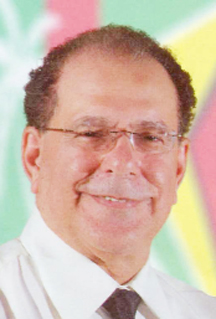Ex-PNCR parliamentarian and broadcast veteran Anthony Vieira is calling on the opposition to use its majority to pass a motion immediately rescinding radio licences that former President Bharrat Jagdeo granted in his last days in office.
Vieira is basing his call on an agreement between late former president Hugh Desmond Hoyte and then President Jagdeo, which said that no new licences would be granted until the establishment of a National Broadcasting Authority.
“[The] awarding of the 12 radio licences is also completely illegal and any licences for communications, including the one for cable, should be immediately rescinded,” Vieira said in a letter published on January 28, 2012.

“Since 2001 as a result of the dialogue between Messrs Jagdeo and Hoyte, it was agreed that no new licences for either radio or television would be issued until an impartial and autonomous National Broad-casting Authority was formed. The communiqué from Messrs Corbin and Jagdeo indicated that this agreement had been ratified, i.e. that no licences would be issued until the Broadcasting Authority is formed,” Vieira said.
He said that during the 11 years which followed, “this provision was used by the government to deny anyone a TV or radio licence, even stations existing at the time (2001) were denied permission to expand their service since it would mean granting them additions to their licences.”
“Channels 6, 9 and 28 wanted to expand to Essequibo, Linden and Berbice, and they were prevented from doing so by the National Frequency Management Unit (NFMU). Channel 28 had already extended to Berbice before the 2001 dialogue, but wanted to expand to Essequibo and Linden and was prevented by the NFMU from doing so,” he said.
He indicated that other persons, such as Rex McKay and Enrico Woolford and numerous others had applied for a radio licence more than 12 years ago.
Speaking to the issue some days ago, Head of the Presidential Secretariat Dr. Roger Luncheon brushed off criticism of the licencees and the process used in approving them and said if “government-friendly individuals” met the criteria, then their applications would have been granted.
Luncheon explained that the President, in the absence of the Guyana National Broadcasting Authority, had the responsibility for issuing the licences. He said according to the law, applicants must be fit and proper; must have the financial means; and must have the technical skills and requirements to obtain spectrum access.
In July last year, President Jagdeo said that when the court made its ruling on the granting of radio licences, a notice was placed in the newspaper saying that no more applications were being taken. But he said that government was obligated to look at the 55 or so applications that had already been received for radio.
“So now that the broadcast legislation is passed, I can then go and fulfill the court ruling and review those applications and probably issue licences to some broadcasting houses for radio,” Jagdeo said in July last year.
Unworkable
In a recent statement, the Guyana Media Proprietors Association called the process used to allocate radio licences “unworkable” and devoid of transparency. The association called on the administration to make public the criteria used to determine the recipients of the licences.
The body greeted the news of the licences with a deep sense of hopefulness, but said there was also a feeling of “great ambivalence, apprehension, and major dissatisfactions.”
“Our elation, that the unnecessarily prolonged radio monopoly maintained by the government is finally ending, is tempered and diminished by both the absence of transparency in the licence granting process and an obscurity in respect to any structured approach to the media licences allocation,” the entity explained. “We continue to view with consternation the unacceptable practice of the Office of the President solely discharging that function of administering the granting of licences and we are aware of the discontent that ensues,” the statement said.
It called for the urgent establishment of a Broadcast Authority, whose proper responsibility will include the analysis of applications and recommendation for the issuance of such licences, saying that continued recalcitrance unnecessarily retards the country’s movement to institutions essential to good governance.
“Such a Commission (Authority) will go a long way to ameliorating the many aggrieved citizens left in obfuscatory darkness and remove criticisms that critical national resources are dispensed mainly on the basis of patronage and that political allegiance is the chief determinant in the distribution of the nation’s resources,” the statement said.
The association added that much of the ills and unprofessional conduct and products of media outlets is directly due to the absence of a broad-based Broadcast Commission (Authority) of competent professionals insulated from the day to day political manoeuvrings of the society and with powers to regulate and apply sanctions if and when necessary. The establishment of such a Commission that will be concerned with the development of the media industry through assistance and guidance for its proper professional functioning in the national interest is long overdue, the association said.
Meantime, it said that in spite of the flawed and concealed process, those granted licences include citizens of good character and ready capability to rise to the collateral requirements of ownership and meet the obligation to function in the public interest.
“The association welcomed the new media enterprises but also expressed bafflement by the indecision of granting or renewing the radio licence of the University of Guyana. The association also applauded the granting of a radio licence to Region One, while expressing a desire to understand what thoughts were given to under-served Regions of the country such as Regions Five and Region Ten and what weight was applied to programme type, human resource capability, and most of all, the capacity for financial sustainability in the decision making process,” the statement added.




